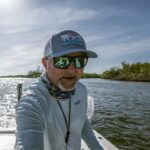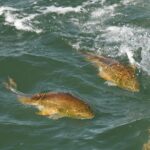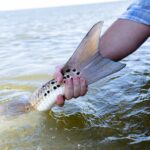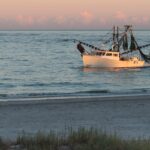
A Veteran Guide’s View of Jacks
If you’ve spent any time on the water in South Florida, chances are you’ve heard
The ASGA team has been advocating for sustainable fisheries on all fronts in 2024. In the same week headlined by Addendum II for striped bass and an NOI hearing for redfish in Louisiana, ASGA Maine Board Member Capt. Kyle Schaefer was called to testify as a witness at the US Senate Budget Committee.
Holding a unique position as a business owner on Maine’s coast and in the Bahamas, Capt. Schaefer sat amongst an esteemed panel and provided a first-hand account of the effects of a changing climate on ocean-based small businesses.

Kyle claims his most significant takeaway is that “we belong here.” He exhibited a whole lot of courage and exuded passion for protecting our oceans while taking a seat on a national stage. In doing so, Kyle set an excellent example for other anglers, outdoorsmen and business owners nationwide.
We’re incredibly proud of Kyle and hope to amplify a behind-the-scenes account of the preparation for this big day in our latest Guide Post Podcast Episode 128: “Senate Testimony Experience.”Available now on all Podcast platforms. You can watch the full hearing including Kyle’s testimony and the witness questioning by clicking here. Additionally, Kyle’s full testimony is written below.
Capt. Kyle Schaefer – January 24th, 2024
Thank you to Chairman Whitehouse, Ranking Member Grassley, and members of the Committee, for inviting me to join you. It’s truly an honor to provide this testimony as a businessperson, an angler, a captain, a father and a first-hand witness to our changing climate. I am a fishing guide from the southern coast of Maine, and I also founded and own a fishing lodge, operating in The Bahamas. Additionally, my work brings me across the country and the world to experience the best angling destinations. I am fortunate to have a finger on the pulse of our nation’s recreational fisheries and I have discovered a formula for success within my industry. The risks of a changing climate are, by far, the most limiting factor of my potential growth and success as an entrepreneur. Climate change has different, specific impacts in every place I fish, and it’s a serious threat to fish and fishing everywhere.
My businesses succeed only as a result of thriving, healthy ecosystems and relatively predictable climate patterns. A complicated combination of clean water, resilient habitats for fish and their prey, and well managed fish stocks are all foundational elements that must be present for me to attract a strong base of clients. Whether you’re a fishing, hunting or mountain guide, operator of a ski resort, or an equipment manufacturer, we must consider a changing climate as we analyze future opportunities and the continued viability of our current businesses. We’re an industry built on the appreciation and love for our wild spaces, in my case, the beautiful ocean and the fish that call these waters home.
The climate trends pose a significant increase in risk and weaken my confidence in a prosperous future for my fishing businesses. NASA has warned that as our planet continues to warm from human caused increases in greenhouse gases that we can expect more frequent and increasingly severe extreme weather events; including extreme heat, hurricanes, wildfire, heavy rains, and marine heat waves (Citation). In my business, that’s a nightmare. Any one of these events can ruin my day, week or entire season with enduring effects on my home fisheries.
As I work my boat across the shallows of my home water in Maine searching for striped bass, foreign fish cross my bow that I’ve never seen before in my waters. I struggle to identify these outliers as my brain can’t quite seem to believe what I see. This is happening on a massive scale and at a rate that I couldn’t have imagined. The Gulf of Maine has been warming 99% faster than the rest of the world’s oceans (Citation). As a result of these changes, I’ve witnessed adult Atlantic bonito, typically found south of Cape Cod, comfortable in the Gulf of Maine. From my boat, I’ve seen black sea bass expanding their range northward and migrating into my home waters. Picture these black sea bass as little hoover vacuums with giant mouths, eating almost anything in their path. With black sea bass quickly adapting their range northward they’re gorging on baby lobsters, causing a major impact on the lobster fishery, the crown jewel of the Maine coast.
Black sea bass aren’t the only threat to lobsters in the Gulf of Maine. Warming waters are causing a mass lobster migration northward into Canada. This has profound implications for coastal communities all along the northeast coast, as lobster supports commercial fishing and is a staple of the summer tourist experience. Southern New England used to be a haven for lobsters, specifically in Long Island sound. But today the distinct sound of motoring lobster boats no longer fills the air in Connecticut and New York as 99% of commercial lobster fishermen have hung up their boots (Citation). In the early 2000’s this fishery began its collapse with the deadly rise in water temperatures reaching critical mass for the tolerance of lobsters. This trend and the impact on this industry will repeat itself in Maine as northern New England waters continue to warm and become unsuitable for lobsters. The shift in lobster stocks is also evidenced by the booming Canadian lobster fishery where in 2021, $3.2 billion were exported, a record year which dwarfs New England’s $510 million harvest in 2022 where $390 million of that came from Maine’s northern waters (Citation / Citation).
There’s no doubt that the creatures living in these warming waters are stressed and struggling to survive. The businesses that rely on these resources are scrambling to adapt. Our fishery management bodies face new challenges as fish migrate out of management regions and into
new ones. Both commercial fisherman and recreational anglers struggle to adapt to shifting stocks creating the economic impacts of increased costs of motoring further, loss of revenue and general unpredictability. Because of climate change, some of these businesses will simply disappear just like the New York lobster industry did. My wife and I have serious dinner time conversations about how we can adapt and financially survive these rapid changes. We’re working to diversify our family income away from our dependence on the ocean. Securing a stable financial future for ourselves and our son is a top family priority.
Striped bass, the most economically important recreational fish on the east coast and my most sought-after quarry in my home waters, are intensely affected by climate change. Striped bass are a resilient fish, but the proper spawning conditions have not been present in the Chesapeake Bay for years with low water flows and warm winters as the major culprits (Citation). We’ve seen five consecutive failed spawning events which, combined with an unaddressed overfished population, has put our beloved striped bass on the brink of a possible collapse. In 2019, Southwick Associates estimated the industry built around striped bass to be valued at $7.7 billion and supporting over 100,000 jobs (Citation). I may be forced to close my charter business within the next few seasons simply because there won’t be enough fish left.
As a captain and guide that focuses on sight fishing (the pursuit of casting at a fish that you can visually see in shallow water) I’ve been challenged by environmental conditions that I never imagined would be a factor. In 2020, western fires raged throughout the summer and smoke quickly spread across the country. In Maine, I witnessed a haze of smoke and particulates that made it impossible to see into the water to sight fish. I lost days of work as a result. The 2023 fires in Quebec provided a similar challenge, but this time, poor air quality and the smell of charred pine trees and hardwoods filled our lungs and burned our eyes.
Climate change is affecting businesses in South Carolina where I hire redfish guides to fish and explore the beautiful low country. Rising sea levels means retreating shorelines and, as a result, loss of fish and bird habitat. South Carolina is famous for their “tailing tides” where redfish come into the salt marshes at the right water level and feed with their tails sticking out of the water. It’s an exhilarating sight for an angler. Changes to our sea levels have the potential to make these “tailing tides” a phenomenon only visited in our memories. Nuances like this are in jeopardy across the country and all over the outdoor industry as our delicate natural world provides us with wonders that our clients go to great lengths to experience.
In the southeast US and The Bahamas hurricanes have intensified and are becoming more frequent, stronger and occur over a longer season. Weather events increasingly disrupt our supply chain, complicating the already challenging task of operating a remote fishing lodge. When the weather is poor the mail boat that delivers essential food stocks and supplies to our island cannot sail as conditions are too dangerous to leave port. During the fall of 2023, I canceled more trips than ever because of unfishable weather. My clients couldn’t get out on the boats safely and were left landlocked at the lodge for multiple days due to high winds and torrential rains. I also canceled groups prior to their arrival due to an unfishable weather forecast. I lost important revenue due to these refunds and displaced trips which quickly eats up a profit margin that we depend on each season.
As hurricanes roll through, they don’t just inflict damage on homes and businesses, they destroy vital fish rearing habitat like mangrove forests and seagrass beds where 75% of commercially harvested fish spend some part of their lifecycle(Citation). When mangroves are ripped out of their soil, from storms like Hurricane Dorian in 2019, entire fisheries are put at risk and must be rehabilitated from a slow, habitat first approach.
Additionally, during the summer of 2023, major coral bleaching events in Florida, The Bahamas and Cuba were observed as an intense, record-breaking marine heat wave suffocated thousands of coral reefs (Citation). These key habitats – coral, mangroves, and seagrass – are essential to support the almost $10 billion Florida fishing industry (Citation).
Many of my colleagues are outfitters and guides in the mountain west where scientists predict that 47% of all trout habitat may be uninhabitable by 2080 and further declines to already threatened salmon and steelhead populations are expected. Scientists have evidence that native cutthroat trout, the jewels of the mountain west, will lose 58% of their remaining habitat by 2080 (Citation). Today these outfitters, guides, and tourists experience frequent river closures due to extreme temperatures that will literally kill fish if caught under those stressful conditions. The western snowpack has become more unpredictable, melting faster and causing intense flooding which results in low water levels midsummer and early fall. I fear for these fish and for my western friends and the future of their businesses.
My clients come to fish with me and my team from all over the country and the world. Many clients come from landlocked states and travel great distances to enjoy my expertly crafted experiences, leaving a paper trail of economic impact from their home all the way to their destination and back again.
As a guide and lodge operator, who spends almost everyday living and breathing the ocean, I am the canary in the coal mine. Climate change and its impact on my businesses and our natural environment is in my face every single day. I represent thousands of employees, executives, and entrepreneurs in my space that are, firsthand, witnessing rapid change, an increase in unpredictable conditions and, as a result, an unpredictable business landscape. Being an entrepreneur is already hard enough, and the increased risk in my industry as a result of climate change is suffocating.
Proactive management to address these challenges is the only path forward and our window to be proactive is closing quickly. My livelihood in the outdoors is my identity and I’ll do whatever it takes to address and prevent the reality of an unpredictable, unfishable future. More than anything I pray that I can leave behind, not only an engrained love and respect of our world’s wild spaces, but also my successful businesses to my almost 3-year-old son. At this pace, and without significant proactive climate action, I can’t imagine what the future holds for my businesses and therefore, my family. I think about the millions of other children around our country that will grow up in a rapidly changing environment with an unprecedented loss of biodiversity and habitat. I want to be proud of what we leave for future generations and that is why I am in front of you today.

If you’ve spent any time on the water in South Florida, chances are you’ve heard

Photo Credit: Graham Tayloe Big Win for Redfish in Alabama Huge news from the Marine

Feature Photo: Carter Abramson | Simms Fishing at the Fisheries Science Symposium We have more

Each year, hundreds of millions of fish are killed as collateral damage from large-scale, inshore
We rely on our members and donations to keep fighting for a sustainable tomorrow in marine conservation.
GIVE THE GIFT OF FISHERIES CONSERVATION THIS HOLIDAY SEASON. SHOP ASGA GOODS THAT FUND FISHERIES RESEARCH & ADVOCACY CAMPAIGNS
JOIN ASGA IN CALLING FOR CRITICAL MANAGEMENT ACTION AFTER YEARS OF SPAWN FAILURES & POOR MANAGEMENT.
By using this website, you agree to our use of cookies. We use cookies to provide you with a great experience and to help our website run effectively. To learn more, please review our privacy policy.
One Response
Great job Kyle. Thank you, ASGA, for sharing Kyle’s comments.